UNMC certified as a ‘tree campus’ for 10 years

The med center has been certified as a “Tree Campus Higher Education” for 10 years. Offered through the Arbor Day Foundation, Tree Campus certification is given to higher education institutions that dedicate time, strategy, education and financing to maintain a diverse, thoughtful tree landscape and culture on campus.
For the certification, the med center must create a tree campus advisory committee, maintain a campus tree-care plan, hold an Arbor Day celebration and conduct service-learning projects annually. The med center celebrated Arbor Day this year by planting a scarlet oak outside the UNMC College of Public Health.
The Tree Campus certification shows the med center’s active efforts towards improving the environment and landscaping on campus. Proper landscaping and tree maintenance contribute to several environmental and health benefits, including:
- Acting as a carbon sink and cleaning the air
- Adding biodiversity and attracting various pollinators
- Cooling the streets and city by breaking up urban heat islands
- Preventing soil erosion and water pollution
Adding trees to landscaping also can support positive health outcomes by reducing stress, supporting the immune system, creating cleaner air to breathe and more. Trees provide shade and cooler temperatures, which can protect both people and building infrastructure during extreme heat.
To enjoy these benefits, consider walking through campus and green spaces on campus before taking a test or attending an important meeting to lower stress and regain focus
Interested in learning more? Join the next tree planting event or sign up to be a LiveGreen Ambassador to participate in sustainability efforts year-round. With questions, contact UNMC sustainability manager Jerrod Bley.
The importance of water conservation
Water conservation is an important part of sustainability and climate resilience efforts.
While water is relatively abundant and cheap in the Midwest today, droughts are becoming more frequent and severe.
Jesse Bell, PhD, Claire M. Hubbard Professor of Water, Climate and Health at UNMC, said, “Drought is a constant issue in the United States, and it is often overlooked by health professionals. For example, many individuals might be surprised to learn that eastern Nebraska is facing extreme to exceptional drought conditions. Because drought is a significant threat to human health, more work is needed to understand local public health threats associated with drought events.”
Dr. Bell’s team has created multiple resources related to this issue, including health impacts associated with drought and preparedness strategies for health departments.
Water conservation is part of the med center’s sustainability plan. The med center has set a 2030 goal for net zero water — that means using the same amount or less water than the annual amount that falls on campus as rain and snow. Since 2012, the med center has saved approximately 349 million gallons of water — the equivalent of 529 Olympic-sized swimming pools.
Strategies for reducing water use have been implemented within buildings and on grounds. Behavior changes through the Every Drop Counts campaign, along with improved landscaping and upgraded infrastructure, have helped the med center make progress toward its goal.
Med center colleagues can support water conservation and the net zero water goal by:
- Reporting all water leaks to facilities immediately. Here’s the link to submit a work order.
- Talking with peers about water conservation efforts.
- Making an announcement about water conversation at staff meetings.
- Turning the faucet on part way and using only the pressure needed.
- Avoiding splashing items when putting stuff down the drain. Pour directly into the drain hole, which saves water and time on rinsing.
In research areas, conserve water by:
- Establishing efficient labware washing practices, such as running dishwashers, autoclaves and cage washers only when they are full, and turning off equipment or putting them into standby mode when not in use.
- Not unwrapping sterile glassware until needed.
- Using the water from eyewash station flushing to water plants or rinse dishes.
- Shutting the fume hood sash, which indirectly saves water by reducing cooling loads and decreasing the makeup water consumed in cooling towers.
For questions or comments, reach out to Jerrod Bley.
Energy Curtailment Days: take action to reduce energy consumption on campus this summer
Energy curtailment is an effort to reduce the amount of energy used when extra stress is put onto energy systems, such as during periods of high heat or humidity. The med center uses energy curtailment days throughout the summer to ensure other systems can function.
During these days, the med center community is asked to reduce their energy usage in a variety of ways, including:
- Closing shades, blinds, and curtains whenever possible to reduce solar heat gain
- If you are on campus, but your neighbors aren’t, please help by closing their window coverings and turning off any lights or equipment you can
- Lowering lighting levels where possible, and turning off lights in unoccupied areas/when leaving a room
- Turning off and unplugging all electrical equipment not in use (computers, coffee makers, printers, chargers, etc.)
- Charging equipment after 7:00 PM
- Shutting fume hood sashes when not in use (remember: “Shut the Sash!”)
- Opening doors manually instead of using the ADA buttons, if possible
- Taking the stairs instead of the elevator, if you are able
- Reminding others to make these simple changes alongside you!
Taking part in curtailment days is crucial for the med center because it:
- Ensures the continuity of essential systems for critical hospital and research functions
- Reduces pollution: lowering your energy usage reduces the amount of greenhouse gasses produced, which have harmful effects on people and the environment
- Improves the health of the entire community: creating more energy on the grid supports people receiving services they need and lowers the effects of health concerns caused by the burning of fossil fuels and other climate-related impacts
- Saves money: reducing your energy usage can decrease the amount of money the med center spends on those utilities. If a large amount of energy is reduced, the med center may have more funds to spend elsewhere
- Supports the med center’s sustainability goals: achieving Net Zero emissions requires all of the med center community to reduce energy consumption and create sustainable systems
Some other important information related to energy curtailment at the med center:
- To report spaces colder than 66 degrees or warmer than 78 degrees, call 2-3347 (Nebraska Medicine) or 9-4050 (UNMC).
- Patient care and research spaces are not affected by energy curtailment.
To learn more about energy curtailment at the med center, please visit the LiveGreen guidance page.
Don’t forget: Parking permit renewals are due June 30
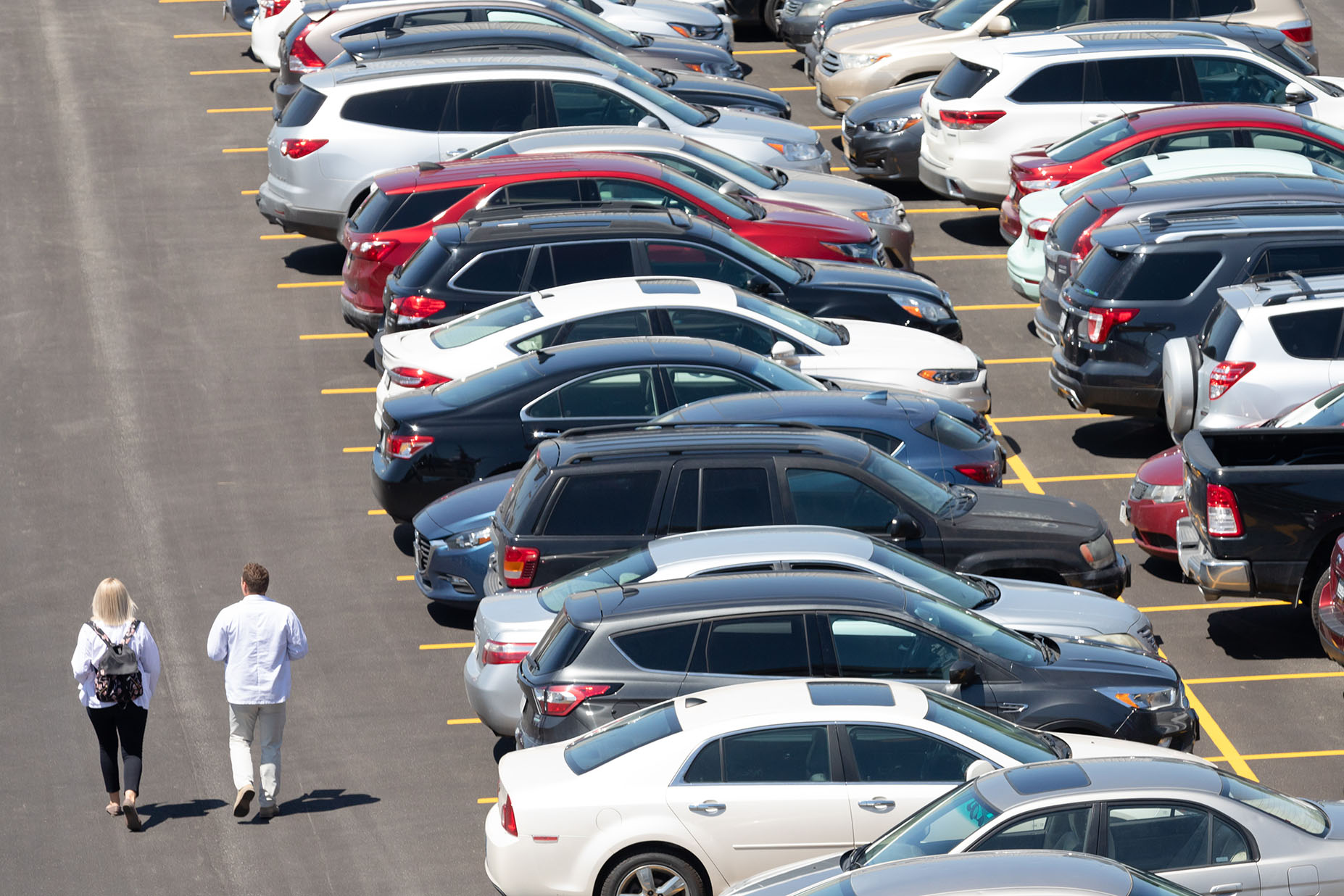
UNMC and Nebraska Medicine faculty, staff and students who park on campus must renew their parking permits by Friday, June 30.
The UNMC Parking Portal opened on May 1 for parking permit renewal or purchase.
Parking rates for most lots for July 1, 2023, through June 30, 2024, will remain the same as current rates; rates will increase, as scheduled, in two of the med center’s 50 lots. Review parking options and monthly rates on this map.
If a renewal isn’t completed by the June 30 deadline, the current permit will be cancelled, the med center colleague will need to cancel their payroll deduction, the assigned lot will be forfeited, and a new application must be completed. Renewals that occur after June 30 must be made in person, via fax (402-559-3500) or by emailing a completed application to parking services.
To renew a current permit, log in to the UNMC Parking Portal with the user’s network login ID and password. All UNMC and Nebraska Medicine employees have an account. Anyone using the system for the first time will need to enter the primary vehicle information. Do not log in as a guest, as the user will not be able to access current parking information or save a vehicle information for future use.
As part of the renewal process, users will be asked for the address so that a new parking permit can be mailed. Please note this permit is for a two-year renewal, so the price displayed includes the cost of parking from July 2023 to June 2024. This does not, however, guarantee the rate for two years. It simply calculates a two-year rate based on FY24 rates; FY25 rates are not set. The balance shown also will not be paid at one time. By selecting “pay now,” users will be authorizing prorated payroll deduction for payments.
For people who park with a carpool parking pass, visit the UNMC Parking Services office in person. Parking services is located inside the Student Life Center at 3908 Jones St. on level two inside the UNMC Bookstore.
To cancel parking, med center colleagues must notify parking services between May 1 and June 30; otherwise the parking payroll deduction will continue. Notify Parking Services via email or by calling 402-559-8580.
Thank you for supporting the planet during April, learn about what happened!
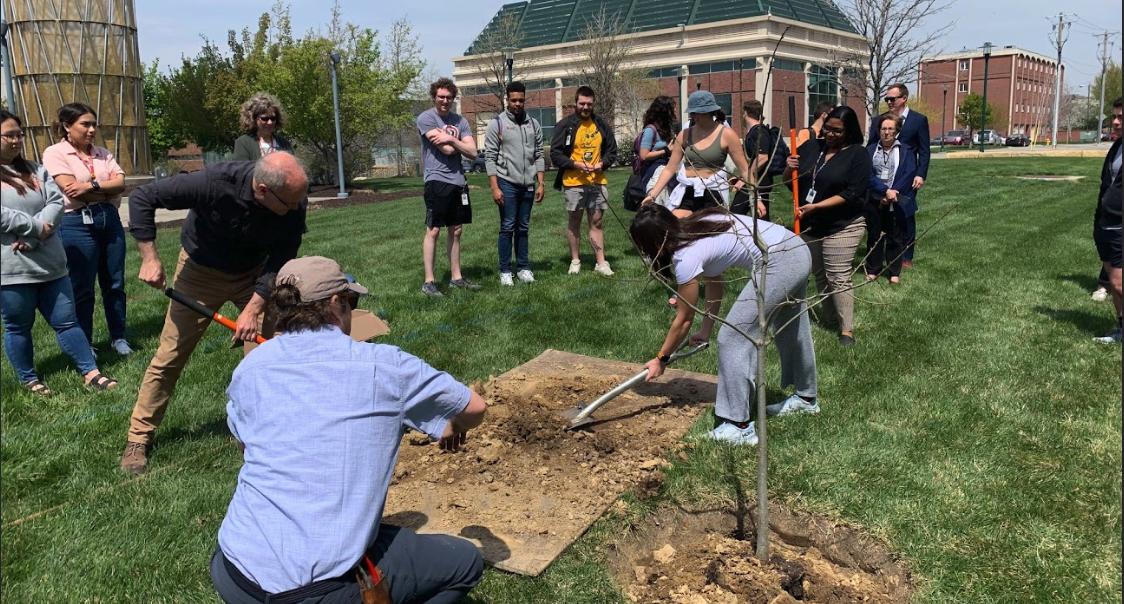
The med center hosted several events and opportunities throughout the month of April to celebrate Earth Month. Thank you to all who participated!
The annual personal document shredding and electronic recycling event on April 18-19 was a big success this year. Thanks to the support from volunteers and those who donated, we diverted from the landfill:
- 5,109 lbs of electronic waste
- 2,402 lbs of personal documents
- 261 lbs of alkaline batteries (approximately 4,000 batteries)
- 140 lbs of assorted media (VHS tapes, DVDs, CDs, and floppy disks)
- 17 lbs of rechargeable/button batteries
The med center community donated:
- $612 and 200 cans of food to the Maverick Food Pantry
- 43 pairs of eyeglasses to the Truhlsen Eye Institute
- 24 lbs of pop tabs to Omaha’s Ronald McDonald House
A big THANK YOU to the volunteers that were able to help out: Barb Wright-Kennedy. Julie Sommer, Sarah Maas, Jackson Schiefelbein, Pat Wortmann, Allison Anderson, Paul Baltes, Brenda Hatcher, Cathy Binstock, Stephen Peters, Euem Osmera, Emily Wiley, and Art Heires. The event wouldn’t have been as successful without you!
All April, the Office of Sustainability hosted the EcoChallenge, an online platform that encourages participants to weave sustainable actions into their daily lives. As a team, we consumed 52 meatless or vegan meals, spent 3,703 minutes outdoors, and saved 37 gallons of water. The Office of Sustainability is continuing the challenge with a focus on biking through June 5 – sign up to log your biking miles here!
The Office of Sustainability also hosted multiple cleanups around campus to collect litter. Teams collected a total of 2.3 lbs of Hefty Orange Bag materials, 3.5 lbs of recycling, and 11.7 lbs of landfill waste. Thank you to everyone who participated!
Chad Kruse and Kelly Johnson joined Sustainability Manager Jerrod Bley to discuss how new development on campus incorporates sustainable design guidelines and impacts our sustainability goals. Thanks so much Chad and Kelly for the insights!
At the Arbor Day tree planting event, students and staff had the opportunity to plant a tree and learn more about trees in Nebraska from Graham Herbst, Community Forestry Specialist for Eastern Nebraska. Visit our new Scarlet oak named “Treeth Urban,” located in the green space west of the Harold M. and Beverly Maurer Center for Public Health.
Earth Month is a great way to participate in sustainability initiatives and activities, but you can join us all year round! Sign up to be a LiveGreen Ambassador and be a part of the core group of colleagues who are driving sustainable change at the med center.
President Carter releases NU System sustainability measures
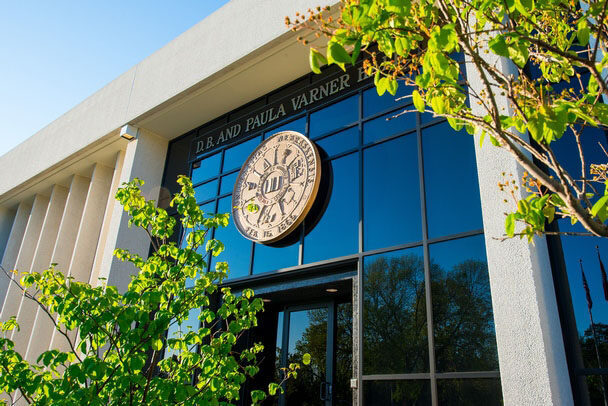
University of Nebraska President Ted Carter has released a new set of sustainability measures for the NU System, drawn from input and ideas from an 80-member team of faculty, staff and students from across the campuses.
The system-wide set of targets – a supplement to existing sustainability plans on the campuses – includes goals for increasing engagement and collaboration in sustainability efforts, using resources responsibly and continuing to integrate sustainability practices in facilities and procurement work where appropriate.
The goals were developed from more than 100 ideas generated by the President’s Sustainability Council, a group convened last year by Carter to help elevate and unite sustainability efforts across the system. Creation of system-wide sustainability measures is part of Carter’s Five-Year Strategy.
“Our goal is to be the best possible stewards of the resources entrusted to us – both natural and fiscal. I am very pleased to share these sustainability measures that reflect the common-sense values of our university and state,” Carter said.
“Our students, faculty, staff and community members have brought great energy and engagement to this effort, and I am thankful for their leadership. We will continue to work together with all Nebraskans to become even more effective and efficient in our use of our precious resources.”
The full sustainability document is available here. Goals include:
- Fund and hire student interns across the NU System to support sustainability outreach and engagement efforts.
- Host an annual Sustainability Summit, rotated among the campuses. The inaugural summit was held this fall at the University of Nebraska-Lincoln’s Innovation Campus.
- Establish a systemwide award to recognize excellence in sustainability. Details and application information on the inaugural award will be released this fall.
- Encourage re-use initiatives that reduce waste and support students, like “career closets” and programs that allow students to easily donate or recycle items when moving out of the residence halls rather than throw them away.
- Set systemwide targets for reducing energy use, water use and waste, and publicize annual progress toward the targets.
- Incorporate sustainability best practices into facilities planning; for example, prioritizing energy efficiency in university buildings to save costs.
- Promote more local purchases by adding a designation for “local” and/or “sustainable” products in the university’s procurement catalog.
- Develop strategies with vendors to reduce packaging waste.
Members of the university community are invited to share systemwide sustainability ideas by emailing the University of Nebraska System at this link.
LiveGreen: A new way to recycle lab coats

The med center is always looking for opportunities to reduce waste and improve its impact on the environment, from recycling batteries to going styrofoam free.
Lab coats are one example of items that are challenging for the med center to dispose of responsibly. In the past, lab coats have been repurposed by giving them to research labs on campus, donating them to local schools or making them into blankets for kids. Recently, the med center took another approach to sustainable disposal of the lab coats — shredding them for home insulation.
The med center collected 938 pounds of lab coats and enlisted a local company, DataShield, to shred them. DataShield mainly provides material destruction services, but it is also committed to remaining environmentally conscious — 100% of shredded material is fully processed and recycled into new products.
The shredded material will help to make homes and businesses more energy efficient. Installing insulation is a great way to celebrate National Weatherization Day on Oct. 30, which highlights the impact of energy efficiency efforts in improving the health and safety of the community. Installing insulation to areas where heat loss can occur is one of the most important weatherization projects, because it has such a significant impact on the energy efficiency of a home.
The partnership with DataShield also aligns with National Energy Awareness Month in October, celebrating efforts to reduce energy use, utilize renewable sources of energy or reduce inefficiencies in energy consumption.
That old lab coat might just be going from on someone’s back into the walls and, at the same time, having a positive impact on health and the environment
Browning prairie plants provide vital cover
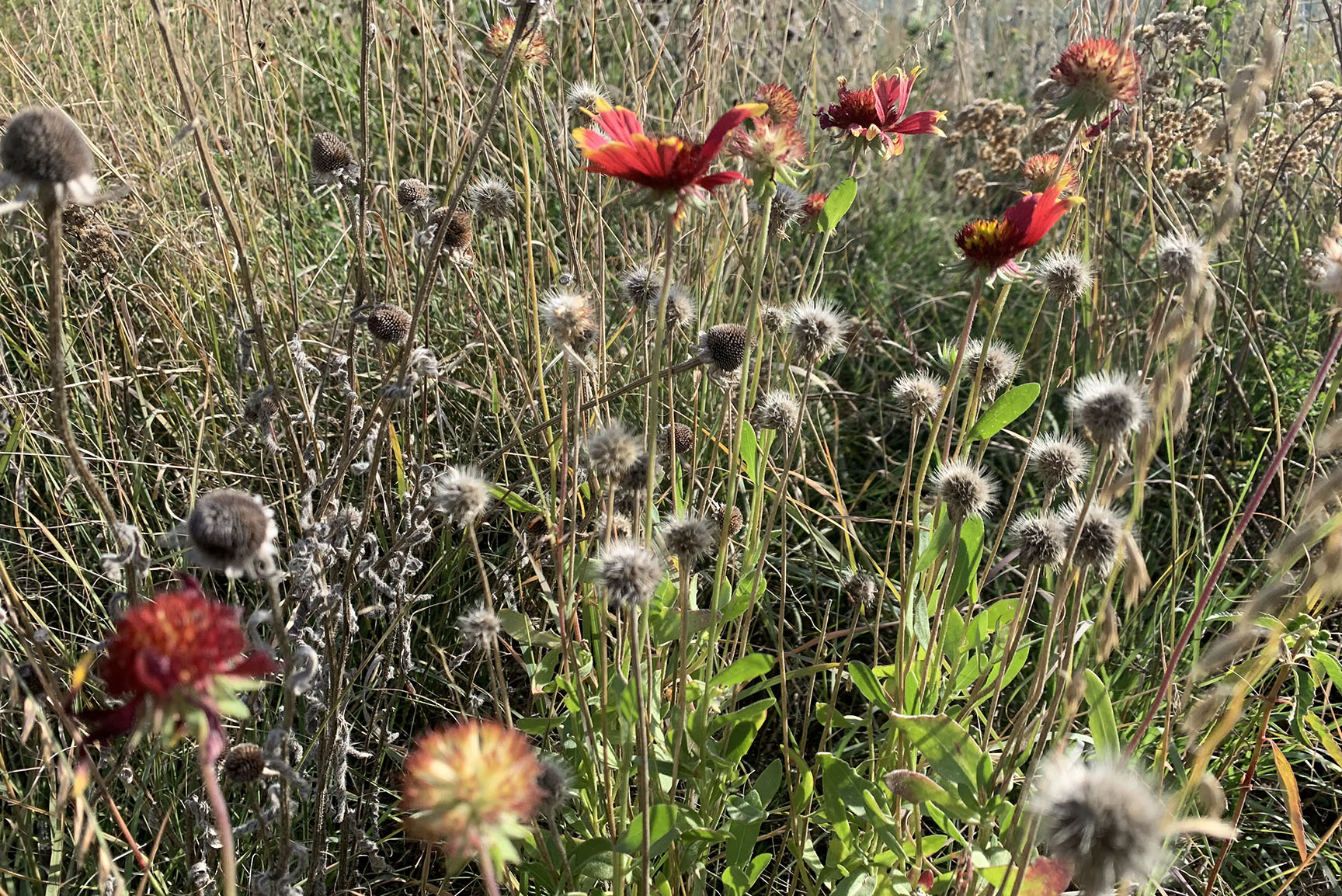
As the dryer weather, the cooler temperatures and the shorter days of an Omaha fall set in, the prairie plantings by the Truhlsen Eye Institute and Lot 64 look different.
Prairie plants detect major seasonal changes and respond accordingly, often by losing their leaves or browning in color. During this time of year, it is tempting to see these sparse, browning plants as an eyesore, but there are many benefits to leaving prairie plants in place during the fall and winter.
Pollinators such as bees, butterflies, moths and birds play a vital role in plant reproduction and species survival. Plant debris, tree bark and stray grasses can provide native bees with a dry and warm habitat for the winter.
Many butterfly species, such as swallowtails and sulphurs, spend the wintertime in a chrysalis, hanging from a plant stem or tucked into the soil. Other butterfly species spend the winter as caterpillars, nesting into a host plant or in a fallen leaf.
Dormant plant beds also provide a vibrant habitat for birds and other insects in the wintertime. Birds are attracted to the insect-rich habitat of a winter garden, where they consume insects and seeds dropped from undisturbed plant heads. When people remove plants and gardens in the fall and winter, it can tear away the habitats of these essential pollinators.
Leaving prairie plants untouched in the fall and winter goes beyond a respect for wildlife. It nurtures the health of the entire ecosystem by providing essential soil and water benefits. Soil is home to a thriving ecosystem of nutrients and living organisms, and it plays a significant role in storing carbon dioxide. Prairie soils in particular contain extensive root systems, and they are especially rich in organic material from the decomposition of plant material from previous seasons.
Removing the protective layer of plants and leaves from the soil leaves it vulnerable to moisture loss and temperature change. Disturbing the composition of soil also disturbs its vital water filtration, carbon storage and flood mitigation capabilities, all important to human health.
Encountering sparse or browning plants during the winter months offers a chance to think about all the life they sustain. To learn more, read The Lowdown on the Prairie article from the Chicago Botanic Garden, or consider planting a prairie garden.
Pawpaw tree planting set for Oct. 6
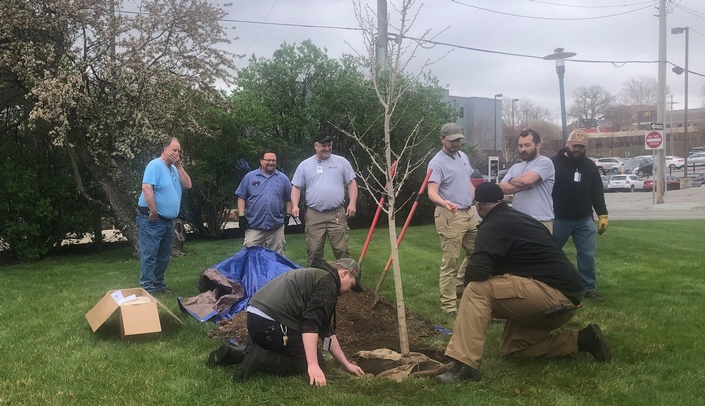
The med center will hold a tree planting event on Thursday, Oct. 6, from 10 a.m. to 11 a.m. at the northwest corner of 41st and Harney streets, and the campus community is invited.
Children from the UNMC Child Development Center will join the event as new pawpaw trees are planted. Attendees will learn about the pawpaw and can talk to a certified arborist, and kids who attend will participate in a fun activity.
Pawpaws have served an important role in U.S. history. They were first harvested by Indigenous communities and later introduced to European settlers, and they are included in works of literature by such writers as Walt Whitman and William Falkner.
Pawpaw trees are relatively short, only around 20 feet tall on average, with large green leaves and a potato-sized green-yellow fruit. Although pawpaw fruit is increasingly popular among fruit lovers, it has a short shelf life, so it is unlikely to be at a local grocery store. Many have described the fruit as a mix between banana, mango and vanilla custard, but others find it bitter and unappetizing.
Pawpaws quickly propagate through their root system, with a mature tree sending up dozens of shoots in a single season. Despite their numbers, pawpaw trees from the same root system are unlikely to cross pollinate, requiring trees from two different plantings to pollinate for the trees to grow their distinctive fruit. Pawpaws are pollinated by carrion flies and beetles, not bees, leading some pawpaw farmers to go so far as to hang roadkill in their trees to attract pollinators.
Although the tree has been around for centuries, little is known about the health impacts or benefits of pawpaws. Renewed interest in this native fruit has gained attention by researchers, who are now exploring if the fruit has any cancer-fighting properties.
Tom Payne, a certified arborist with UNMC, said adding pawpaw trees to campus is important for campus tree planning. Tree diversity strengthens the campus tree canopy, and the pawpaws will be the first on the UNMC and Nebraska Medicine campus.
Having a healthy campus tree canopy can help reduce the temperature on campus by breaking up urban “heat islands,” and act as a carbon sink and clean the air. Having access to natural environments can also help support psychological well-being.
All-campus #WeAreUNMC barbecue set for today
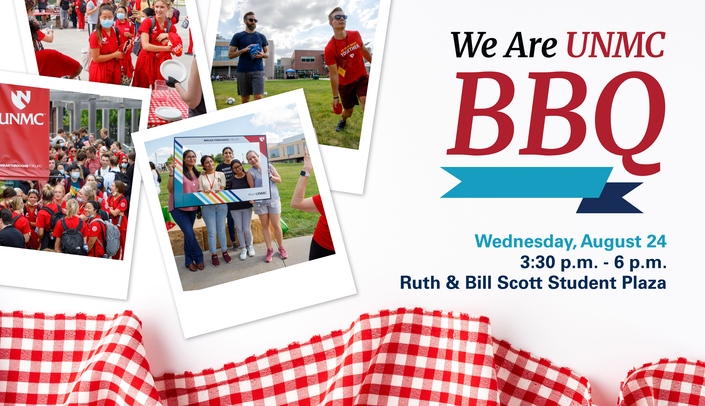
Faculty, staff and students all are welcome to attend the #WeAreUNMC BBQ from 3:30-6 p.m. today at the Ruth and Bill Scott Student Plaza.
“The barbecue provides us an opportunity to welcome back students and show appreciation to our faculty and staff,” said Channing Bunch, director of student life inclusion and diversity. “There will be delicious food, activities and a chance to get to know your fellow classmates and coworkers.”
UNMC IDs will be required to attend the event. Music will be provided by Complete Music, and the food stations will be provided by Sodexo. There will be backyard games and giveaways (while supplies last). All are encouraged to bring lawn chairs or blankets.
Each year, the Office of Sustainability aims to make this event zero waste, which means that 90% of the waste created at the event is not sent to the landfill. This year, they’re striving to beat last year’s diversion rate of 71% and hit 90% again, as happened in 2019.
The event is hosted by the UNMC Student Senate and the Student Life Inclusion and Diversity Office and sponsored in part by Metro Credit Union and GreenSlate Management, in collaboration with the UNMC Department of Strategic Communications, the Office of Community Engagement, the Center for Healthy Living, the Office of Sustainability and the UNMC Bookstore.
The rain location will be in the Truhlsen Events Center on the first floor of the Sorrell Center.
